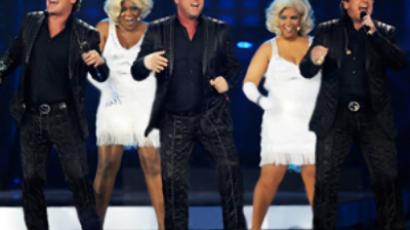Eurovision: music contest turned political?
The Eurovision Song Contest is about to get underway in Moscow. Every year the event is dogged by some form of controversy, and this year is no different, as a number of acts try to promote causes close to their hearts.
Some argue, however, that the coming Eurovision, which will hit Moscow on May 12,14, and 16, has already surpassed all previous controversy records.
First, there were the dubious lyrics in the Georgian entry of the “Stephane and 3G” trio. What Georgia claimed was nothing but "a disco-funk hit," Russia took it as a personal insult.
Many people didn't like the line in the chorus "We Don't Wanna Put In" – a not-so-subtle play on Prime Minister Putin's name.
Still, some Georgians say that there was nothing political, let alone offensive in the lyrics, claiming that it is just a successful pun.
The European Broadcasting Union, however, didn't see the joke, and banned Georgia from this year's event. They deemed the entry political which violates the contest rules.
But another political song, which comes from Israel, has a chance of being heard by an estimated TV audience of 500 million.
"There must be another, must be another way," says the line from the song of an Arab-Jewish duo Noa and Mira Awad praying for peace – something some Israeli Arabs could hardly bear.
Many took "another way" as a tardy and weak apology for the bloody Gaza offensive – and accused Israel of using the contest for its own political ends.
Still, the duo insists that it is only their personal civil stance.
“I continue to believe that even in the most difficult times, it is our responsibility to continue to convey a message of dialogue and coexistence, even in such a strange place like Eurovision,” said Achinoam Nini, better known under her stage name, Noa.
One of the biggest controversies, however, came with host Russia's choice of the song ‘Mamo.’
Ukrainian born singer Anastasia Prikhodko got more than a quarter of the nationwide vote with a song written by an Estonian and a Georgian. Accusations flew of more politicizing.
“It is strange to me that a Ukrainian will represent Russia. In such case, let’s make Dynamo Kiev football club play for Russia,” said music producer Iosif Prigozhin. “I think it wasn’t fair play and the votes were rigged.”
Fair or not – the audience vote stands. So the joint fruit of former Soviet republics, whose relations with Russia are far from ideal, will represent Russia at this year's Eurovision.
By now, all the tickets to Eurovision have been sold, and next Saturday 20 thousand people will pack the Olympyisky Arena in the center of Moscow.
Despite the controversies, they will see the final of one of the world’s favorite song contests, which is being held in Russia for the first time in its 50 year history.













